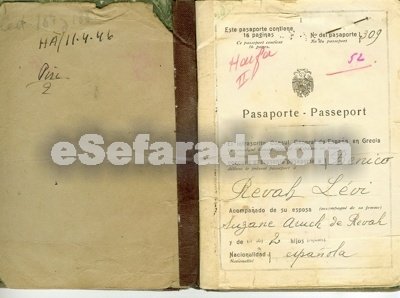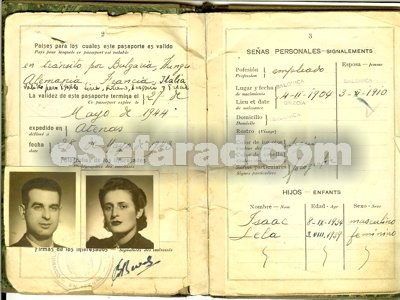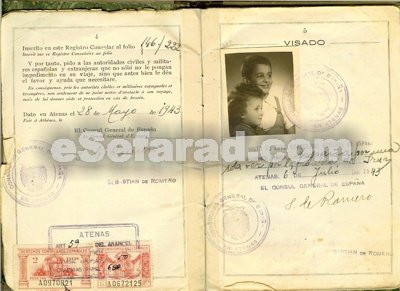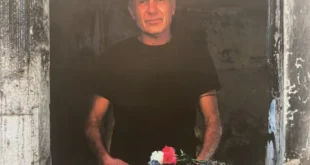My name is Isaac Revah, born September 8, 1934 in Thessaloniki, Greece, son of Benico Revah and Suzanne Revah (née Aruch). I also have a sister Léla Sadai born August 3, 1939 also in Thessaloniki. My family was of Spanish nationality by my father, the nationality of origin of my mother being Greek. The Revah family had Spanish passports even before the decree of December 20th 1924 of Primo de Ribera.
Our family was part of a group of 367 Jews of Thessaloniki, having a Spanish passport, deported to Bergen-Belsen on August 2, 1943 and released before the end of the war (February 13, 1944), and eventually sent to Spain, thanks to their nationality. However a person was instrumental in the negotiations with the German authorities which started on April 1943 and lasted until December 1943. He undertook the diplomatic steps in order to prevent our deportation and, after our transfer to Bergen-Belsen, to obtain our liberation: this person is Sebastian de Romero Radigales, General Consul of Spain in Athens. He had a difficult task since his action was restrained by the Spanish government which was ambiguous in its official position: hesitating between a refusal and an agreement for repatriation. In the beginning the Spanish authorities are unfavourable to the repatriation recommended by Sebastian Romero Radigales and state that Spain “was unable to integrate such a great number of Jews, Spanish nationals”. This did not discourage the Consul in his efforts aiming to save us from extermination.

I was 9 years old at the time of our deportation to Bergen-Belsen in August 1943 so that my personal knowledge about the efforts of Sebastian de Romero Radigales, to avoid our deportation and afterwards obtain our liberation from Bergen-Belsen, results partly from what I was told after the war by my parents or, in 1963, by Rachel Ezratty Revah a first cousin of my father. Rachel was the wife of Solomon Ezratty, the Vice Consul from Spain in Thessaloniki in 1943, who assisted Romero Radigales in his efforts. My testimony is based on this information that I gathered from my family.
As will be shown below, Sebastian de Romero Radigales acted continuously in order to convince the Spanish authority above him to “repatriate” to Spain the Jews with Spanish nationality from Greece. He communicated through the Spanish Embassy in Berlin either to pass his demands to the ambassador Ginès Vidal or to transmit his messages to the Minister of Foreign Relations, Jordana, in Madrid. As will be seen he very often went well beyond what he was allowed to as a Consul. His interventions were crucial since he had to convince the Spanish authorities that the accumulation of continuous hesitations on the decision to “repatriate” the Jews with Spanish nationality from Greece, would certainly lead to their extermination by the Germans.

The deportation of the Jews with Spanish nationality of Thessaloniki
The Germans invade the North of Greece in April 1941 and reach Thessaloniki in three days. They apply the racial laws and measures against the Jews since 1942: obligatory forced labour, expropriations, destruction of the historical Jewish cemetery. 45.000 Jews of Thessaloniki are deported (that is to say 95% of the Jewish population) to Birkenau during the period March to August 1943. The last convoy leaves Thessaloniki in August 1943. From the Jewish population a group of 520 people is preserved miraculously until July 1943, because of their Spanish nationality, and my family is part of them. We did not have to leave our home but I remember the change of atmosphere at home and, for example, the German soldiers searching our apartment and showing us how well they played piano….I do remember also the events related to the notification by the Germans to the heads of the Spanish families to assemble at Beth Saul and the gathering of the families in the Baron Hirsch camp.
During this period Spain did not give a real support for its nationals. It showed hesitation, passivity and often delayed action, whereas, for example, the Italian government provided support and protection to its Jewish nationals. In spite of the hostile and negative official position, the General consul of Spain in Athens Sebastian de Romero Radigales, who arrived in April 1943, as well as the Vice consul of Spain in Thessaloniki, Solomon Ezratty, whose wife was a first cousin of my father, do not spare their efforts to try to avoid the deportation of the Spanish nationals. In vain Sebastian Romero Radigales and Solomon Ezratty ask the German authorities to allow the “repatriation” in Spain. The Ministry for Foreign Affairs in Madrid hesitates, is unfavourable with these steps and does not plan indeed to open its borders to the Spanish Jews. It declares that Spain “was unable to integrate such a great number of them”. However in the middle of 1943, Franco and his foreign minister Jordana, take into account the evolution of the military situation becoming more favourable to the Allies, decide to treat them with more consideration on the long run and consider a possible solution of repatriation subject to obtaining substantial financial counterparts of the Americans. On their side the Germans agree to preserve the nationals of a friendly state: they decide not to deport us immediately. They fix to Spain the end of June 1943 as a deadline to take the decision on our repatriation. However the Spanish Ministry for Foreign Affairs although having his back to the wall, does not react and no decision is taken.

Several rumours circulated then in Thessaloniki on the intentions of the Germans concerning the Jewish Spanish nationals: repatriation to Spain via Germany or transfer to Athens with the agreement of Italy, and, then repatriation. The 4 figures that appear at the end of the testimony, show indeed that these rumours were plausible. The figures correspond to pictures of pages 1 to 9 of our family passport issued on March 28, 1943, a few months before our deportation, and signed by Sebastian de Romero Radigales.
In spite of our hopes, in July 1943, the Germans make the decision to send the Spanish nationals to Bergen-Belsen and transfer them to an extermination camp in Poland if Spain would not claim them within a two months period.
On July 29, 1943 the heads of family are gathered in the temple Beth Saul in order to take the instructions relative to their “journey”: repatriation to Spain after a short stay in Germany. The Germans tell them that they are authorized to carry with them food, personal effects and even their valuables.
They are interned in the camp “Baron Hirsch” where their families join them carrying in particular light clothing for the announced destination, Spain. I remember well the small houses of the camp (all the Revah stayed in the same house, including the Vice-Consul Salomon Ezratty).

I remember the railway station, opposite to the camp, from where the trains left for the concentration camps, and also the faces of a group of Jewish collaborators watching us and stealing our belongings, explaining that these will be given back to us before the departure of the train for Germany. This did not happen.
We left Thessaloniki on August 2 in cattle wagons, without water or food: we are 441 persons (367 Spanish nationals and 74 Greeks). Naturally we were beforehand deprived of all our personal belongings and the valuables which we carried. Our travelling condition were the usual ones for deported Jews: herded together like cattle in wagons without any opening, the families laying down on the ground on mattresses of straw without any blankets, the toilet being a barrel with a hole for the flow outside, practically no food or drink. The convoy stopped close to Nuremberg while this city was bombarded by the allies.
While we were travelling, Berlin is informed that the Spanish government was finally ready to repatriate our group in Spain in transit, for three months. The move of Madrid from an uncompromising position to a repatriation solution was not guided by any humanitarian concern. It is mainly due to the continuous pressure exerted, since April 1943, by Sebastian de Romero Radigales on the Ministry of Foreign Affairs and by the decision of the American Joint Distribution Committee, agreeing to take responsibility for all transport and life costs in Spain as well as the expenses to obtaining the visas for a later destination out of Spain. However an additional condition is imposed by the authorities of Madrid: a new group of refugees could be sent to Spain from the concentration camp, only if the preceding group had left the country. The agreement of Spain to repatriate us arrives too late since we are already on our way to Bergen-Belsen where we arrive 12 days after our departure from Thessaloniki. Spain then requires of the Germans “to treat us well”…
In Bergen-Belsen, we are separated from the Greek nationals and occupy 2 or 4 huts I do not remember (the French word for it is “baraque”), in a special camp “of Jews to exchange», also named the “neutral’ section. To exchange against who? Against Germans residing in Palestine???. Women and men are separated. If our group is isolated from the other parts of the camp it is to avoid, in the event of our release, testimonies on the exactions, tortures and massacres to which were subjected the other Jewish deportees, Russian or Polish prisoners.
Our living conditions were less cruel than those of the other prisoners: we were not imposed to “work”, we did not have a number tattooed on the arm, we did not carry the striped dress and we could wear our shoes whereas the other prisoners did not.
I was 9 years old and the memories that I preserve are those of a child who is not aware of the threat which weighs on him and of his privileged statute. I suspected the hostility of the medium but it did not seem to me that I was concerned. I went through events certainly unexplainable, with resignation: calls, lasting for ever (3 or 4 times systematically), in the cold, in row four by four, very early in the morning, perhaps also in midday and then in the afternoon; over-populated dormitories (I slept with my father, my uncles and my cousin, in the dormitory for men), infested with lice; the diseases (typhus); the total absence of hygiene. The only drink available was a black liquid which was described as “coffee” because water was not drinkable; lack of food and the permanent feeling of hunger; parents having still cigarettes, exchanging them against “a soup » bowl or depriving themselves of the little bread distributed to give it to their children. Disinfection of clothing and shower, every three days: we stayed on line during hours in front of the building in an extreme cold before being able to wash ourselves, without understanding well why the Germans cut off the water at the time when, covered with soap, we wanted to rinse ourselves. It was their game. After the shower, still wet, new call in the cold. However, during the day, I was never separated from my parents and sister who was 4 years old at the time.
I also remember that the children followed a course of bible and mathematics given by fellows-prisoners and that we played ”train” sometimes, with Polish children of Argentinean nationality interned with us.
It is clear that the children, of whom I was, did not perceive the gravity of the situation which they lived and that the adults endeavoured to occult to them.
Our living conditions were degrading and generating suffering, but we were treated better than the other deportees. They endured a cruelty without common measure compared to that which we underwent. That explains my feelings of humility with regard to those which did not have a Spanish nationality to protect them.
In November 1943 Madrid requires our repatriation officially, while imposing two conditions there:
– a new group of refugees could proceed to Spain provided the preceding group left it,
– that the American Joint Distribution Committee agrees to cover all the life and transport expenses in Spain as well as the expenses of a later departure out of Spain.
Following this decision, the Germans start to prepare our departure. Two groups are formed to leave at one week interval. The Revah as well as the Vice-Consul Solomon Ezratty belong to the second group. Naturally the families of the second group are desperate and very worried, persuaded that after the departure of the first group the Germans would reconsider their decision. It was not thus, and we are released on February 7, 1944 and directed, by train, to Spain. Travelling on board third class coaches, we cross in full war, Germany (we saw Mannheim burnt down), then France. We arrive in the early morning, February 13, 1944, at the Port Bou frontier post in Spanish territory, close to Perpignan. We are welcomed there by Dr. SEKERA President of the Joint Distribution Committee in Spain.
Finally free in Spain, that liberated us from a Nazi camp and welcomed us indeed. We were given as of our arrival, by the Joint Committee the essential items, correct clothing and financial support. Port Boo remained in my memory of child as the place of a second birth with the return of normality in my life. Normality which was not any more an abstract concept but a fact. The symbol of freedom which my memory held for Port Bou included the banana offered to me on the station platform. It was the first healthy food which I had tasted for several months.
Spain kept us only 4 months in Barcelona: just like Primo de Ribera, Franco refused to authorize the Jews of Spanish nationality to establish in Spain. The reason given for that was that” it was necessary to make place for other Spanish deportees who waited to be released «.
We all leave Barcelona, except for our cousin Vice Consul Solomon Ezratty authorized by a special measure of Franco to reside in Spain. Our travel is placed under the responsibility of the Joint Committee. We leave on June 14, 1944 for Cadiz and from there, under the potential threat of the German submarines, we are transferred to Casablanca on board an American ship transporting troops.
We lived under tent until the end of October 1944, in a camp bearing the name «Marshal Lyautey «, of the UNRRA (United Nations Relief and Rehabilitation Agency) managed by the Americans, and close to the city. The director of the camp, an American officer M.N. Beckelman made any possible effort so that our stay proceeds under good material and moral conditions: pleasant atmosphere, possibility of sending the children to school, work proposed to the adults in the camp or downtown, training in different activities for a later reintegration in the working world, artistic activities.
It is by boat in December 1944 that we were transferred to Port Said via Naples in Italy, and then by bus from Port Said to Gaza in Palestine under British Mandate. After one period of quarantine under the very difficult and deplorable conditions imposed by the British troops, we settle in Tel-Aviv. Some among us chose to return to Greece as from August 9, 1945; my family decides to establish in Paris in April 1948.
The humanitarian and decisive action of Sebastian de Romero Radigales in favour of our repatriation to Spain.
a) It is not surprising that the course of events between our deportation from Thessaloniki to our liberation from Bergen-Belsen stays present in my mind permanently. However the happiness to live that I withdrew from our release of the Nazi camp, was always close in my conscience to a feeling of discomfort. That was particularly true during my adolescence in Paris when I realized that, eventually, the person who had the full authority and position to save us from the Germans, was Franco. After many hesitations and successive postponements of an official diplomatic statement, Franco required officially our liberation from Bergen-Belsen at the end of 1943. Franco has thus been our saviour.
This was difficult to explain that, in the years 1950, to:
– my class fellows who focused themselves on the acts of criminal dictators such as Franco and Salazar,
– my friends, children of exiled Spanish republicans, whose families had fought against Franco and had suffered from it.
But, this discomfort, progressively disappeared as I found out that the instrumental person for our liberation was the General Consul of Spain in Athens: Sebastian de Romero Radigales. He was the person who tried during months to convince the Ministry of Foreign Affairs in Madrid hostile to his interventions, to reach an agreement with the German government. The act to save is multiform and results from a series of interventions: Sebastian de Romero Radigales tried them all. He never gave up in the face of failures of his successive attempts or the blames of Madrid. Without him, without the diplomatic protection he provided to us, our lives would not have been preserved. To be released during the war from a concentration camp by the Nazis is an unbelievable event. This became a reality for 367 persons thanks to the exceptionally courageous and human Sebastian de Romero Radigales who merits obviously the title of Righteous among the nations.
b) One must stress the difficult conditions under which Sebastian de Romero Radigales undertook to convince the Spanish Ministry of Foreign Affairs to intervene. The Ministry had to rise with the German Ministry for Foreign Affairs, the issue of the protection and repatriation to Spain of the group of Spanish Jews of Thessaloniki. The ambiguity of the Spanish policy on the matter lead to an absence of a clear position and will of the Spanish government. So that the Germans decide to plan in detail the deportation of the 367 Spanish Jews who were still in Thessaloniki then. The reaction of Spain is twofold: on the one hand it wishes to save our lives and, on the other hand, it is reluctant to repatriate us. Its policy is hesitant and unstable. Thus one day Spain emits an official statement declaring «we are willing to repatriate them and preserve their goods «. Then, later on: » we agree on the principle of repatriation but it is suspended, and we need the list of the people concerned «. These tergiversations persuade the Germans that Spain has no further interest in the Jews of Spanish nationality of Thessaloniki. Moreover it continuously raises objections on details of the repatriation such as the number of people concerned.
It is within this complicated context that Sebastian de Romero Radigales, fully aware of the critical situation of the Spanish Jews, undertakes actions aiming to save this group from deportation. He warns his authorities on the consequences of a delay in or a refusal of repatriation: there is a risk of death in a concentration camp, moreover a passive attitude of Spain would not be understood by the Allied Countries, especially since at the same time, the Italian authorities repatriate their Jewish nationals. Sebastian Romero Radigales proposes even solutions of replacement: instead of Spain transfer to Turkey (refusal of Turkey), repatriation by sea on a boat of the Red Cross, transfer to Athens (refusal of the Germans).
How exceptionally courageous was this person! Guided by humanitarian convictions, he permanently acted to obtain our repatriation and, later, our liberation from Bergen-Belsen, and this often without orders of his Ministry of Foreign Affairs. As a consequence, Madrid asked him on several occasions to cease any action related to our repatriation and to avoid being too zealous. His interventions in order to obtain our release became even more urgent when we were deported to Bergen-Belsen. He then convinces Madrid to inform Berlin that the Spanish government agrees to repatriate us and that the Germans should organize as soon as possible our liberation and repatriation. I owe my survival to an out of the ordinary person who showed strong solidarity with persecuted individuals.
Sebastian Romero Radigales fully deserves the title of Righteous among the nations.
 eSefarad Noticias del Mundo Sefaradi
eSefarad Noticias del Mundo Sefaradi


I have desperately been trying to find family of my step-grandmother, Buena Revah Tiano, who was taken with my grandfather, Itzhak Tiano and his children with their families to Auschwitz, murdered there. Does anyone know how I can reach Isaac Revah to see if he knows if they were related?
Los Angeles
310-360-8899
Solo decir que cuanto me alegra saber que algunos españoles ayudaron a por lo menos, algunos de su propio pueblo puesto que todos los sefardíes son españoles aunque primero sean hijos de Israel